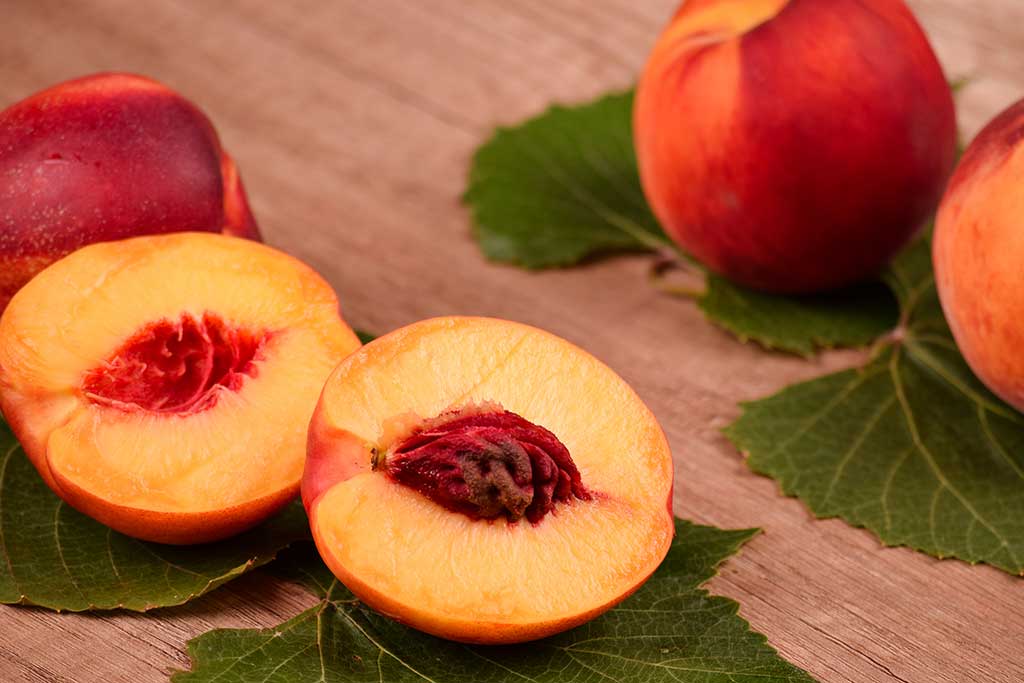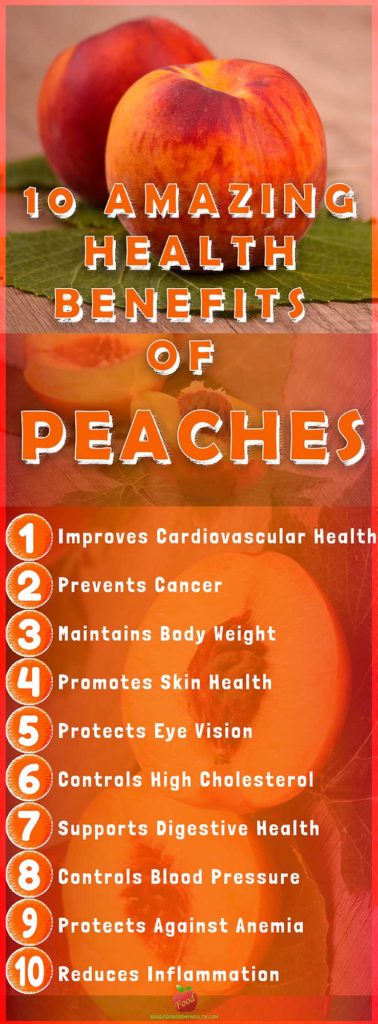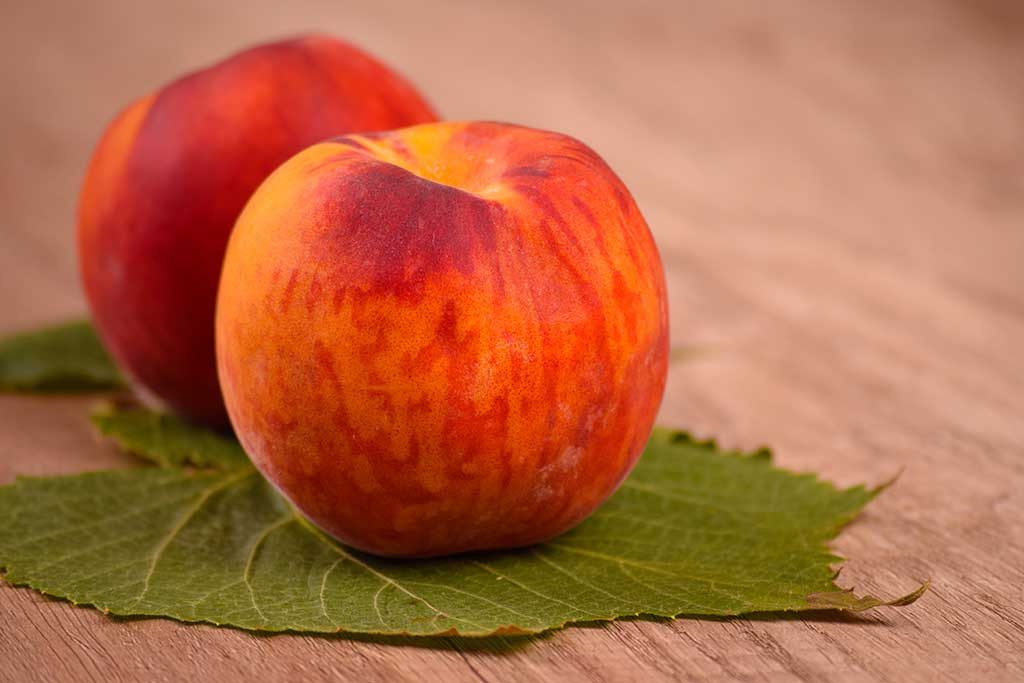10 Amazing Health Benefits of Peaches
Description: The peach is the fruit of the peach tree (‘Prunus persica’ [L] Batsch.), a tree of the botanical family Rosaceae. The fruit is a typical drupe: fleshy pulp with a hard stone in the center.
Habitat: Peaches are raised in temperate regions in Southern Europe, the Americas, and Asia. They are very sensitive to freezing.
THE PEACH origins are in China. From there it was taken to Persia (Iran) and after that spreading throughout the Mediterranean more than two thousand years ago, it was introduced in the Americas by the Spaniards. The peach has adapted well to each region where it has been taken. Today more than half of the world’s peach production is from the Americas.
To enjoy a peach completely it must be tree ripened. They are at their best a day or two after they have been harvested. Savoring a peach under these circumstances is an unforgettable experience. Of course, it is difficult for city dwellers to share this delight, since most peaches are picked green and ripened in storage.
The peach is a fruit that provides cardiac energy. It is a diuretic, a mild laxative, and a depurative.

Peach composition:
Peach composition is a balanced combination of provitamin A (beta- carotene) , B group vitamins, vitamin C, vitamin E, potassium, magnesium, and vegetable fiber, all in moderate amounts. Peaches contain virtually no sodium or fat. They do contain 9% fructose and other sugars and less than 1 % proteins.
It may be said that the composition of the peach is almost perfect for a healthy heart. Vitamins A, C, and E are nature’s best antioxidants, and few foods contain all three in such balance. The antioxidant effect of these vitamins maintains artery health in general, and those that nourish the heart in particular.
It has been proven that antioxidant vitamins inhibit the deterioration of arteries known as arteriosclerosis thus improving blood flow to tissues and organs. The arteries that suffer the most wear and tear are those that nourish the heart. Because of this, the heart benefits specifically from the abundant consumption of foods rich in vitamins A. C, and E.
The B group vitamins (B1, B2, niacin, and B6), which are found in peaches in significant quantities, are necessary for heart muscle cell contraction utilizing the energy of fatty acids and sugars.
Potassium, very abundant in peaches and magnesium are minerals essential to maintain normal, strong heartbeat rhythm.
In addition to all of this, the peach has possibly the lowest fat content of any fresh fruit. Most fresh fruit contains very little fat. Fat from fruit, if any is always healthful vegetable fat, primarily unsaturated. It is notable that the peach holds the record for being the lowest in fat: 0.09%, in other words, less than one thousandth. This makes peaches a basic food in low-fat diets that are often prescribed for cardiac patients or the obese.
Not only is the peach the lowest of any fruit in fat, its sodium content is also among the lowest, with only one milligram (mg) per 100 g of edible portion. A low sodium diet helps avoid arterial hypertension and aids the heart’s activity.
Peaches are medically indicated in the following cases:
- Heart disease: Eating peaches is of benefit whenever there is any degree of heart failure, any impairment in the heart’s capacity’ to perform effectively its pumping activity. Even though peaches are not a direct heart stimulant, they do aid the work of this organ.
- Ischemia (insufficient blood) in the coronary arteries, manifested by angina or myocardial infarction.
- Valve lesions that interfere with the heart’s pumping capacity.
- Arterial hypertension, which requires more heart effort.
- Myocardiopathy, a disease consisting of the degeneration of the cardiac muscle, who’s most common cause, is the consumption of alcoholic beverages.
- Digestive disorders: Peaches are easy to digest when they are ripe. They contain soluble vegetable fiber that acts as an emollient in the digestive tract. It is a mild laxative.
- Kidney disorders: Peaches are mildly diuretic, which, together with very low sodium and protein content, make them excellent for those with renal failure.
- Obesity: Peaches are among the best fruits for creating a sensation of satiety, thus reducing the appetite. Their caloric content is quite low: 43 kcal/100 g. additionally, its depurative action facilitates the removal of the acidic metabolic waste that frequently accompanies obesity.
Preparation and Use
- Fresh: The peach’s velvety peel may produce an allergic reaction in sensitive individuals, thus they should be peeled. The peel may also carry pesticide residuals. While it is true that the peel contains vitamins, eating a little more peeled peach easily compensates for this loss.
- Canned: While canned peaches provide somewhat fewer vitamins and minerals, they have the advantage of being available year-round. Peaches canned in as little sugar as possible are preferable.
- Marmalade and juice.
Pin Us On Pinterest

Related: 10 Amazing Health Benefits of Cherries

